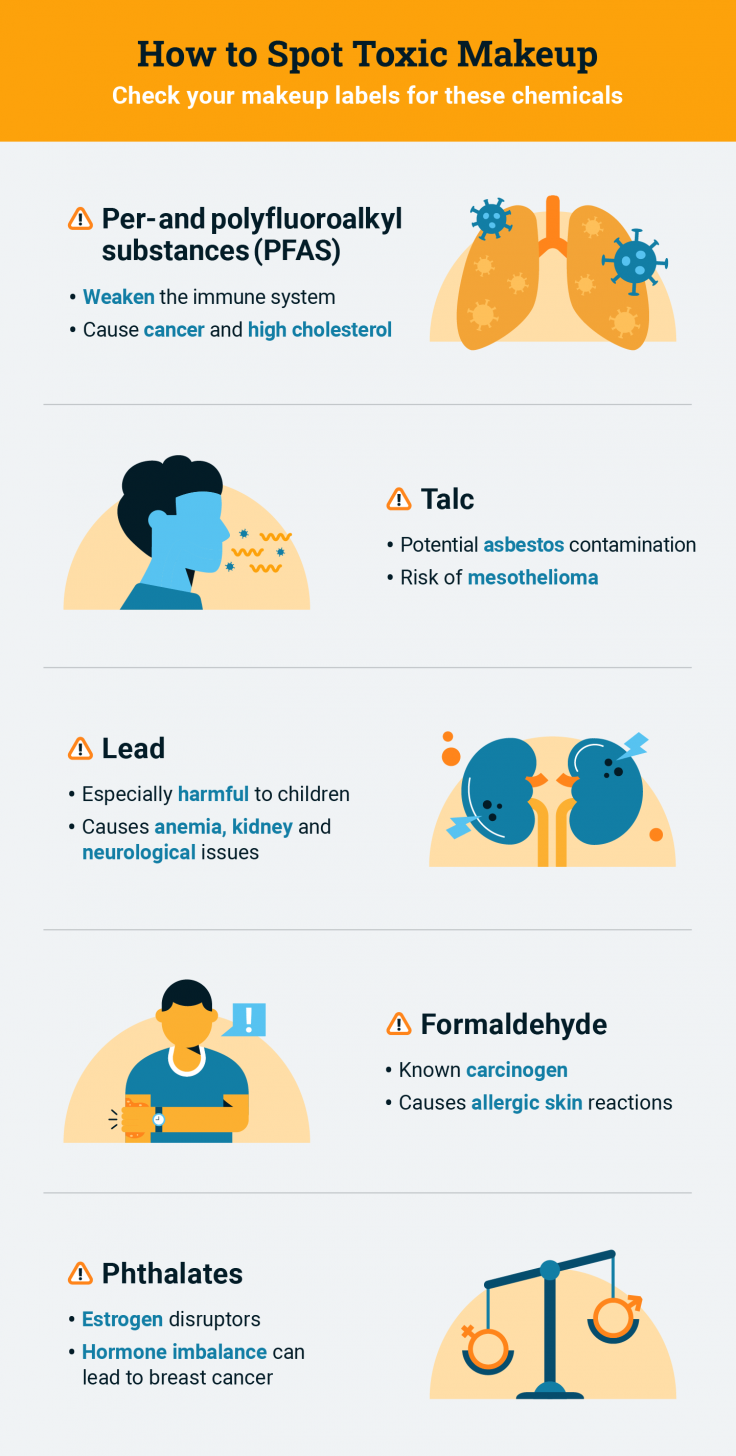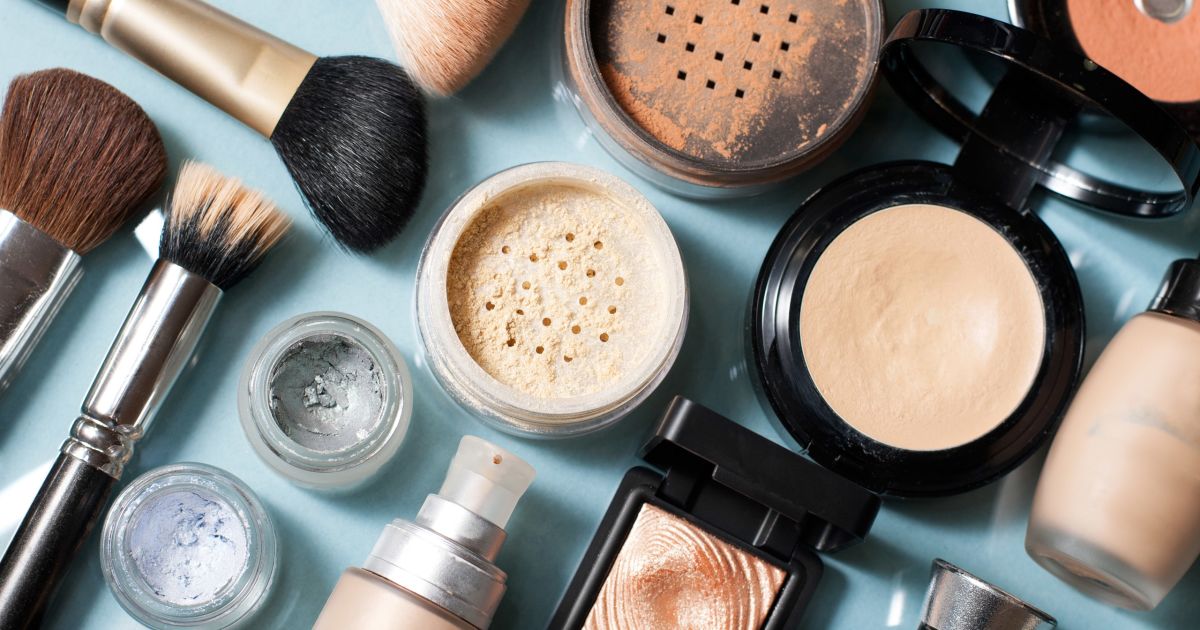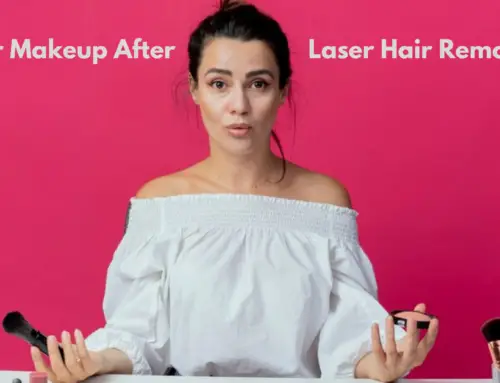When it comes to our daily beauty routines, one question often arises: can makeup cause cancer? It is a concern shared by many, especially considering the extensive use of cosmetics and personal care products. While the idea of makeup causing cancer may seem unsettling, understanding the potential risks is crucial for making informed decisions about the products we use.
Over the years, there has been ongoing research into the relationship between makeup and cancer. The use of certain ingredients in makeup, such as parabens and phthalates, has raised concerns due to their potential endocrine-disrupting effects. These substances have been found in some makeup products, leading to questions about their long-term impact on our health. However, it’s important to note that the evidence linking makeup directly to cancer is still limited and inconclusive.
While there is no conclusive evidence that makeup directly causes cancer, certain ingredients in makeup products may carry potential risks. Some chemicals, like parabens and formaldehyde-releasing preservatives, have been linked to cancer. It’s important to choose makeup brands that prioritize safety, avoiding products with these harmful ingredients. Additionally, proper application and removal techniques can minimize any potential risks. Always read labels, do your research, and consult with professionals if you have concerns about makeup and its potential impact on your health.

Can Makeup Cause Cancer?
Makeup has become an essential part of many people’s daily routines. It helps enhance our features and boost our confidence. However, there have been concerns about the potential health risks associated with certain makeup products. One of the most common questions is whether makeup can cause cancer. In this article, we will explore this topic in detail and provide you with the necessary information to make informed decisions about your makeup choices.
Understanding Makeup Ingredients
Before diving into the relationship between makeup and cancer, it’s important to understand the ingredients commonly found in cosmetics. Many makeup products contain a combination of chemicals, minerals, oils, and pigments. While the majority of these ingredients are safe for use, some may have the potential to cause adverse effects.
The safety of makeup products is regulated by government agencies such as the Food and Drug Administration (FDA) in the United States. These agencies set guidelines and regulations to ensure the safety of cosmetic ingredients. Despite these regulations, it’s crucial for consumers to be aware of potential risks and make informed choices.
The Controversy Surrounding Makeup and Cancer
There is ongoing debate and research regarding the link between makeup use and cancer. Some studies suggest that certain chemicals found in cosmetics could be carcinogenic, meaning they have the potential to cause cancer. However, it’s important to note that the evidence is inconclusive, and more research is needed to establish a definitive connection.
It’s essential to keep in mind that the concentration and duration of exposure to potentially harmful chemicals play a significant role in their potential to cause harm. In many cases, the amount of these chemicals in makeup products is very low and unlikely to pose a significant risk to most individuals.
Potential Risks and Protective Measures
While the risk of makeup causing cancer is still uncertain, there are some precautions you can take to minimize potential risks:
- Choose trusted brands: Opt for reputable makeup brands that prioritize safety and adhere to regulatory guidelines.
- Read labels carefully: Familiarize yourself with the ingredients in your makeup products and avoid those with known potential risks.
- Avoid expired products: Using expired makeup can increase the risk of contamination and potential adverse effects.
- Practice good hygiene: Wash your hands thoroughly before applying makeup to prevent the introduction of harmful bacteria.
- Remove makeup properly: Ensure you remove your makeup before going to bed to prevent potential skin irritation or clogged pores.
The Importance of Individual Factors
It’s worth noting that individual factors, such as genetics, lifestyle choices, and overall health, can also play a role in the development of cancer. Makeup use alone is unlikely to be the sole cause of cancer. It’s essential to maintain a balanced lifestyle, including a healthy diet, regular exercise, and routine medical check-ups, to reduce the risk of various diseases, including cancer.
The Bottom Line
While the relationship between makeup and cancer is still being studied, the current evidence is not sufficient to conclude that makeup causes cancer. However, it’s crucial to be mindful of the ingredients in your makeup products and make informed choices. Opt for trusted brands, read labels, and practice good hygiene to minimize potential risks. Remember that maintaining a healthy lifestyle and taking care of your overall well-being are key factors in reducing the risk of various diseases, including cancer.
Can Makeup Cause Cancer? FAQ
Now, let’s address some common questions related to makeup and its potential connection to cancer:
1. Can a specific type of makeup product cause cancer?
There is no clear evidence that points to a specific type of makeup product causing cancer. The potential risk lies in the ingredients used in makeup products, and it varies from product to product.
2. Are natural or organic makeup products safer?
Natural or organic makeup products may contain ingredients derived from natural sources, but they can still pose potential risks depending on the specific ingredients used. It’s important to read labels and do your research when choosing any makeup product.
3. Can makeup products increase the risk of skin cancer?
The main risk factor for skin cancer is exposure to ultraviolet (UV) radiation from the sun or tanning beds. Using sunscreen and protecting your skin from excessive sun exposure are more effective ways to reduce the risk of skin cancer than avoiding makeup products altogether.
Key Takeaways: Can Makeup Cause Cancer?
- While there is no definitive evidence that makeup directly causes cancer, certain ingredients may increase the risk.
- To reduce the potential risk, choose cosmetics that are labeled as “cancer-free” or “hypoallergenic.”
- Regularly check the ingredients list for chemicals such as parabens, phthalates, and formaldehyde, which have been linked to cancer.
- Properly remove makeup before bed to minimize prolonged exposure to potentially harmful substances.
- Consult a dermatologist if you have concerns about the safety of your makeup products.
Frequently Asked Questions
Can makeup cause cancer? This is a common concern among many individuals. While there is ongoing research and some potential risks associated with certain ingredients in makeup products, it is important to understand the facts and make informed decisions about cosmetic use.
1. Is there scientific evidence linking makeup to cancer?
The scientific community is continuously conducting research to understand the potential link between makeup and cancer. While some studies have found certain ingredients in makeup to have carcinogenic properties in high concentrations or with prolonged exposure, the overall evidence is inconclusive. It is important to note that the cosmetic industry is heavily regulated, and products are required to meet safety standards.
Manufacturers are also required to conduct safety assessments and label their products with ingredients, warnings, and expiration dates. However, it is always advisable to review ingredient lists and consult with a healthcare professional if you have specific concerns.
2. Which makeup ingredients should I be cautious of?
While there may not be a definitive list of makeup ingredients that directly cause cancer, some ingredients have raised concerns in certain studies. These include parabens, phthalates, formaldehyde, and certain heavy metals such as lead or arsenic. However, it is worth noting that the majority of makeup products available on the market are safe for use when used as intended. It is always a good idea to read product labels, do your research, and choose reputable brands.
If you have certain sensitivities or known allergies, it is essential to avoid ingredients that may trigger adverse reactions and consult with a dermatologist or allergist if needed.
3. Are natural or organic makeup products safer?
Natural or organic makeup products are often marketed as safer alternatives due to their use of plant-based and non-toxic ingredients. However, it is important to note that even natural ingredients can have allergenic or irritating properties for some individuals.
It is crucial to read labels, understand the ingredients used, and consider individual sensitivities. Additionally, the term “natural” or “organic” is not regulated, so it is important to research and choose trusted brands that adhere to rigorous safety standards.
4. What can I do to minimize potential risks?
To minimize potential risks associated with makeup use, you can take several precautions:
1. Choose reputable brands that prioritize safety and adhere to regulations.
2. Read product labels and avoid ingredients that you may be sensitive to or have had adverse reactions to in the past.
3. Store your makeup properly to prevent bacterial growth or contamination.
4. Avoid sharing makeup products, as this can increase the risk of bacterial or viral infections.
5. Keep an eye on product expiration dates and discard expired or deteriorated products.
6. If you have specific concerns or a history of allergies, consult with a dermatologist or allergist for personalized advice.
5. Should I completely avoid wearing makeup?
Avoiding makeup altogether is a personal choice. While there are potential risks associated with makeup use, many individuals enjoy the cosmetic benefits and enhance their confidence through makeup application.
If you have concerns about the potential risks, you can consider minimizing your use, opting for makeup-free days, or choosing lighter, more natural formulations. It is essential to find a balance that aligns with your personal preferences and comfort level.

Shocking Levels of Cancer-Causing Benzene Found in Beauty Products
In summary, there is no definitive evidence to suggest that makeup directly causes cancer.
However, certain ingredients in makeup, such as parabens and phthalates, have been linked to potential health risks, including hormone disruption and allergies.






Leave A Comment